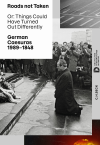Roads not Taken
Or: Things Could Have Turned Out Differently
Zusammenfassung
“It could have turned out differently” – from this perspective, the volume looks at fourteen caesuras in German history between 1848 and 1989. Here the real and crucial historical events are considered against the backdrop of other historical developments that were always possible – developments inherently present in decisive, often dramatic turning points. In this way new light is shed on what is already known, the essential openness of history made evident. What would have happened if the East German security services had violently turned on the demonstrators in 1989? If the USA had dropped atomic bombs on Germany in 1945? How would Germany have turned out if the effort to establish a constitutional monarchy had succeeded in 1848? This book accompanies the exhibition “Roads not Taken” in the Deutsches Historisches Museum, whose titel has a programmatic dimension: following a concept of the historian Dan Diner, he and the other authors focus on possible historical alternatives. What unexpected coincidences might have altered the real historical events? What role did the personalities involved play in their unfolding? Themes such as Germany’s Ostpolitik, the Berlin Wall, the Cold War, the Nazi rise to power, revolution and democratization in Germany are newly evaluated in this way.
- Kapitel Ausklappen | EinklappenSeiten
- 2–6 Titelei/Inhaltsverzeichnis 2–6
- 7–10 Preface — Raphael Gross 7–10
- 11–21 Roads not Taken. Or: Things Could Have Turned Out Differently. A Talk with Dan Diner on the Exhibition Concept 11–21
- 22–41 1989 22–41
- Stroke of Luck – Revolution. What If: The Protests and Demonstrations Are Brutally Crushed — Julia Franke
- 42–61 1972 42–61
- Détente – Ostpolitik. What If: Willy Br ndt Is Voted Out of Office as Chancellor — Stefan Paul-Jacobs
- April 1972: Rainer Barzel Becomes Chancellor — Bernd Rother
- 62–81 1961 62–81
- Fear – The Berlin Wall Goes Up. What If: The Berlin Crisis Triggers a Nuclear Disaster — Stefan Paul-Jacobs
- In the Government Bunker – The First Days of the Third World War — Jörg Diester
- 82–99 1952 82–99
- Lures – The Stalin Notes. What if: The Path Leads to Reunification — Stefan Paul-Jacobs
- Pictorial Space and Pictorial Time in a Socialist Utopia: Walter Womacka’s Mosaic Our Life on the Haus des Lehrers in Berlin — Oliver Sukrow
- 100–113 1948/49 100–113
- Systems – Cold War. What If: The Berlin Blockade Leads to War — Stefan Paul-Jacobs
- 114–129 1945 114–129
- Escaped – Atomic Bomb. What If: Ludwigshafen Is Struck by an Atomic Bomb — Stefan Paul-Jacobs
- 130–149 1944 130–149
- Assassination Attempt – 20 July. Too Late! Attempted Coup and Holocaust — Julia Franke
- 150–163 1936 150–163
- Va Banque – Rhineland. What If: France Prevents Hitler’s Expansion — Stefan Paul-Jacobs
- 164–179 1933 164–179
- “A Miracle” – 30 January. What If: Military Dictatorship Instead of Nazi Dictatorship? — Lily Reyels
- The Avoidable Catastrophe: 30 January 1933 — Heinrich August Winkler
- 180–201 1929 180–201
- Hardship – Economic Crisis. What If: Brüning Succeeds in His Policy Change — Lily Reyels
- Economic Policy Debate in the Journal Der deutsche Volkswirt during the Great Depression — Roman Köster
- 202–219 1918 202–219
- Unstable? Weimar. What If: A Monarchy Provides the Footing for a Democratic Constitution — Lily Reyels
- “But the Firm … Can and Must Be Ret ined”: The SPD and the Question of Monarchy versus Republic — Walter Mühlhausen
- 220–235 1914 220–235
- Abyss – August. What If: Can the Social Democrats Prevent the War? — Stefan Paul-Jacobs
- Street Protests against the War in July 1914 — Stefan Paul-Jacobs
- 236–249 1866 236–249
- Empire – In the Midst. What if: A “Third Germany” rises — Stefan Paul-Jacobs
- 250–270 1848/49 250–270
- Failure – Revolution. What If: A Dream Comes True — Lili Reyels
- Karl Biedermann’s Account of the Journey of the Frankfurt Deputation — Monika Wienfort
- 271–286 Appendix 271–286
- Literature
- Authors
- Lending institutions and licensers
- Thanks
- Illustration credits
- Credits
- 287–287 About the book 287–287
- 287–287 About the editors 287–287


